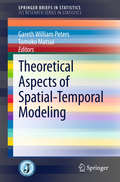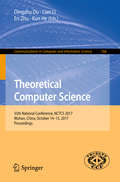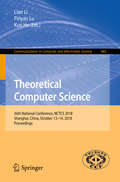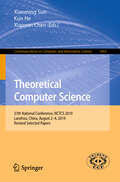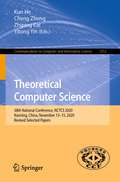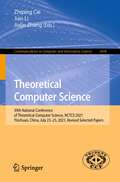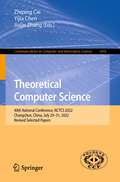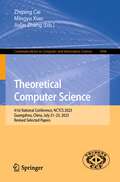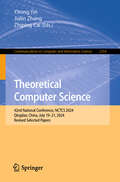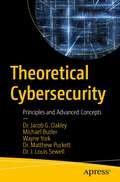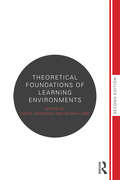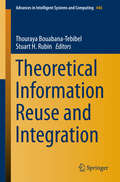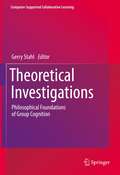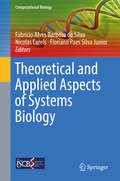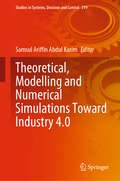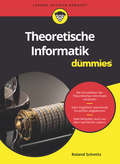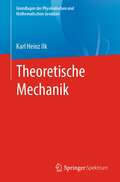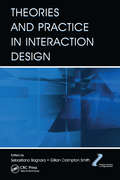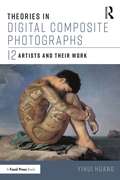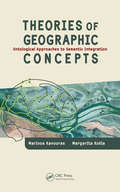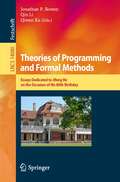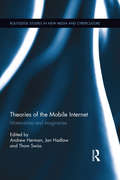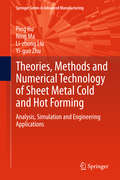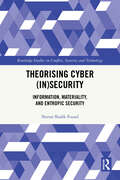- Table View
- List View
Theoretical Aspects of Spatial-Temporal Modeling
by Gareth William Peters Tomoko MatsuiThis book provides a modern introductory tutorial on specialized theoretical aspects of spatial and temporal modeling. The areas covered involve a range of topics which reflect the diversity of this domain of research across a number of quantitative disciplines. For instance, the first chapter provides up-to-date coverage of particle association measures that underpin the theoretical properties of recently developed random set methods in space and time otherwise known as the class of probability hypothesis density framework (PHD filters). The second chapter gives an overview of recent advances in Monte Carlo methods for Bayesian filtering in high-dimensional spaces. In particular, the chapter explains how one may extend classical sequential Monte Carlo methods for filtering and static inference problems to high dimensions and big-data applications. The third chapter presents an overview of generalized families of processes that extend the class of Gaussian process models to heavy-tailed families known as alpha-stable processes. In particular, it covers aspects of characterization via the spectral measure of heavy-tailed distributions and then provides an overview of their applications in wireless communications channel modeling. The final chapter concludes with an overview of analysis for probabilistic spatial percolation methods that are relevant in the modeling of graphical networks and connectivity applications in sensor networks, which also incorporate stochastic geometry features.
Theoretical Computer Science
by Lian Li Dingzhu Du En Zhu Kun HeThe satisfiability (SAT) problem is central in mathematical logic, computing theory, and many industrial applications. There has been a strong relationship between the theory, the algorithms, and the applications of the SAT problem. This book aims to bring together work by the best theorists, algorithmists, and practitioners working on the SAT problem and on industrial applications, as well as to enhance the interaction between the three research groups. The book features the application of theoretical/algorithmic results to practical problems and presents practical problems for theoretical/algorithmic study. Major topics covered in the book include practical and industrial SAT problems and benchmarks, significant case studies and applications of the SAT problem and SAT algorithms, new algorithms and improved techniques for satisfiability testing, specific data structures and implementation details of the SAT algorithms, and the theoretical study of the SAT problem and SAT algorithms. It features: a comprehensive review of SAT research work over the past 25 years; the most recent research results; and a spectrum of algorithmic issues and applications.
Theoretical Computer Science: 36th National Conference, NCTCS 2018, Shanghai, China, October 13–14, 2018, Proceedings (Communications in Computer and Information Science #882)
by Lian Li Kun He Pinyan LuThis book constitutes the thoroughly refereed proceedings of the National Conference of Theoretical Computer Science, NCTCS 2018, held in Shanghai, China, in October 2018. The 11 full papers presented were carefully reviewed and selected from 31 submissions. They present relevant trends of current research in the area of algorithms and complexity, software theory and method, data science and machine learning theory.
Theoretical Computer Science: 37th National Conference, NCTCS 2019, Lanzhou, China, August 2–4, 2019, Revised Selected Papers (Communications in Computer and Information Science #1069)
by Kun He Xiaoming Sun Xiaoyun ChenThis book constitutes the thoroughly refereed proceedings of the National Conference of Theoretical Computer Science, NCTCS 2019, held in Lanzhou, China, in August 2019. The 11 full papers presented were carefully reviewed and selected from 28 submissions. They present relevant trends of current research in the area of algorithms and complexity, data science and machine learning theory, and computational model.
Theoretical Computer Science: 38th National Conference, NCTCS 2020, Nanning, China, November 13–15, 2020, Revised Selected Papers (Communications in Computer and Information Science #1352)
by Kun He Cheng Zhong Zhiping Cai Yitong YinThis book constitutes the thoroughly refereed proceedings of the 38th National Conference of Theoretical Computer Science, NCTCS 2020, held in Nanning, China, in November 2020. The 13 full papers presented were carefully reviewed and selected from 28 submissions. They present recent research in the areas of algorithms and complexity, matrix computation; deep learning; network communication and security.
Theoretical Computer Science: 39th National Conference of Theoretical Computer Science, NCTCS 2021, Yinchuan, China, July 23–25, 2021, Revised Selected Papers (Communications in Computer and Information Science #1494)
by Jian Li Jialin Zhang Zhiping CaiThis book constitutes the thoroughly refereed proceedings of the 39th National Conference of Theoretical Computer Science, NCTCS 2021, held in Yinchuan, China, in July 2021. The 67 full papers were carefully reviewed and selected from 145 submissions, and 14 of them were selected for the volume. The papers present recent research in the areas of information hiding, data detection and recognition, system scheduling, time series prediction, and formal analysis.
Theoretical Computer Science: 40th National Conference, NCTCS 2022, Changchun, China, July 29–31, 2022, Revised Selected Papers (Communications in Computer and Information Science #1693)
by Yijia Chen Jialin Zhang Zhiping CaiThis book constitutes the refereed proceedings of the 40th National Conference on Theoretical Computer Science, NCTCS 2022, held in Changchun, China, during July 29–31, 2022.The 13 full papers and 6 short papers included in this book were carefully reviewed and selected from 58 submissions. They were organized in topical sections as follows: computational theory and model; approximation algorithms; artificial intelligence; and system and resource scheduling.
Theoretical Computer Science: 41st National Conference, NCTCS 2023, Guangzhou, China, July 21–23, 2023, Revised Selected Papers (Communications in Computer and Information Science #1944)
by Mingyu Xiao Jialin Zhang Zhiping CaiThis book constitutes the refereed proceedings of the 41st National Conference on Theoretical Computer Science, NCTCS 2023, held in Guangzhou, China, during July 21–23, 2023.The 16 full papers included in this book were carefully reviewed and selected from 70 submissions. They were organized in topical sections as follows: theoretical computer science, algorithm complexity, artificial intelligence, algorithm design, machine learning theory, computational model, formal methods, network security, software and application security.
Theoretical Computer Science: 42nd National Conference, NCTCS 2024, Qingdao, China, July 19–21, 2024, Revised Selected Papers (Communications in Computer and Information Science #2354)
by Jialin Zhang Zhiping Cai Yitong YinThis book constitutes the refereed proceedings of the 42nd National Conference on Theoretical Computer Science, NCTCS 2024, held in Qingdao, China, during July 19–21, 2024. The 13 full papers included in this book were carefully reviewed and selected from 75 submissions. They were organized in topical sections as follows: Algorithm Design, Approximation Algorithms, Logics, and Artificial Intelligence Theory and Algorithm, Algorithm Application.
Theoretical Cybersecurity: Principles and Advanced Concepts
by Michael Butler Jacob G. Oakley Wayne York Matthew Puckett J. Louis SewellThere is a distinct lack of theoretical innovation in the cybersecurity industry. This is not to say that innovation is lacking, as new technologies, services, and solutions (as well as buzzwords) are emerging every day. This book will be the first cybersecurity text aimed at encouraging abstract and intellectual exploration of cybersecurity from the philosophical and speculative perspective. Technological innovation is certainly necessary, as it furthers the purveying of goods and services for cybersecurity producers in addition to securing the attack surface of cybersecurity consumers where able. The issue is that the industry, sector, and even academia are largely technologically focused. There is not enough work done to further the trade—the craft of cybersecurity. This book frames the cause of this and other issues, and what can be done about them. Potential methods and directions are outlined regarding how the industry can evolve to embrace theoretical cybersecurity innovation as it pertains to the art, as much as to the science. To do this, a taxonomy of the cybersecurity body of work is laid out to identify how the influences of the industry’s past and present constrain future innovation. Then, cost-benefit analysis and right-sizing of cybersecurity roles and responsibilities—as well as defensible experimentation concepts—are presented as the foundation for moving beyond some of those constraining factors that limit theoretical cybersecurity innovation. Lastly, examples and case studies demonstrate future-oriented topics for cybersecurity theorization such as game theory, infinite-minded methodologies, and strategic cybersecurity implementations. What you’ll learn The current state of the cybersecurity sector and how it constrains theoretical innovation How to understand attacker and defender cost benefit The detect, prevent, and accept paradigm How to build your own cybersecurity box Supporting cybersecurity innovation through defensible experimentation How to implement strategic cybersecurity Infinite vs finite game play in cybersecurity Who This Book Is For This book is for both practitioners of cybersecurity and those who are required to, or choose to, employ such services, technology, or capabilities.
Theoretical Foundations of Learning Environments
by Susan Land David JonassenTheoretical Foundations of Learning Environments provides students, faculty, and instructional designers with a clear, concise introduction to the major pedagogical and psychological theories and their implications for the design of new learning environments for schools, universities, or corporations. Leading experts describe the most important contemporary theories that form the foundation of the conception and design of student-centered learning environments and new applications of educational technologies. This book is well suited as a textbook for courses in instructional design, educational psychology, learning theory, curriculum theory and design, and related areas. The rise of constructivism and its associated theories represented a paradigm shift for educators and instructional designers to a view of learning as necessarily more social, conversational, and constructive than traditional transmissive views of learning. This bestselling book was the first to provide a manageable overview of the altered field, and the second edition has been fully updated to include expert introductions to Metacognition, Argumentation, and other key contemporary theories.
Theoretical Information Reuse and Integration
by Thouraya Bouabana-Tebibel Stuart H. RubinInformationReuse and Integration addresses the efficient extension and creation ofknowledge through the exploitation of Kolmogorov complexity in the extractionand application of domain symmetry. Knowledge, which seems to be novel, canmore often than not be recast as the image of a sequence of transformations,which yield symmetric knowledge. When the size of those transformations and/orthe length of that sequence of transforms exceeds the size of the image, thenthat image is said to be novel or random. It may also be that the new knowledgeis random in that no such sequence of transforms, which produces it exists, oris at least known. Thenine chapters comprising this volume incorporate symmetry, reuse, andintegration as overt operational procedures or as operations built into theformal representations of data and operators employed. Either way, theaforementioned theoretical underpinnings of information reuse and integrationare supported.
Theoretical Investigations: Philosophical Foundations of Group Cognition (Computer-Supported Collaborative Learning Series #18)
by Gerry StahlComputers have transformed how we think, discuss and learn—as individuals, in groups, within cultures and globally. However, social media are problematic, fostering flaming, culture wars and fake news. This volume presents an alternative paradigm for computer support of group thinking, collaborative learning and joint knowledge construction. This requires expanding concepts of cognition to collectivities, like collaborative groups of networked students. Theoretical Investigations explores the conditions for group cognition, supplying a philosophical foundation for new models of pedagogy and methods to analyze group interaction. Twenty-five self-contained investigations document progress in research on computer-supported collaborative learning (CSCL)—both in Stahl’s own research and during the first decade of the CSCL journal.The volume begins with two new reflections on the vision and theory that result from this research. Representing both ethnomethodological and social-constructivist research paradigms, the investigations within this volume comprise a selection of seminal and influential articles and critical commentaries that contribute to an understanding of concepts and themes central to the CSCL field. The book elaborates an innovative theory of group cognition and substantiates the pedagogical potential of CSCL. Theoretical Investigations: Philosophical Foundations of Group Cognition is essential as a graduate text for courses in educational theory, instructional design, learning and networked technologies. The investigations will also appeal to researchers and practitioners in those areas.
Theoretical and Applied Aspects of Systems Biology (Computational Biology #27)
by Nicolas Carels Fabricio Alves Barbosa da Silva Floriano Paes Silva JuniorThis book presents the theoretical foundations of Systems Biology, as well as its application in studies on human hosts, pathogens and associated diseases. This book presents several chapters written by renowned experts in the field. Some topics discussed in depth in this book include: computational modeling of multiresistant bacteria, systems biology of cancer, systems immunology, networks in systems biology.
Theoretical, Modelling and Numerical Simulations Toward Industry 4.0 (Studies in Systems, Decision and Control #319)
by Samsul Ariffin Abdul KarimThis book presents theoretical modeling and numerical simulations applied to drive several applications towards Industrial Revolution 4.0 (IR 4.0). The topics discussed range from theoretical parts to extensive simulations involving many efficient algorithms as well as various statistical techniques. This book is suitable for postgraduate students, researchers as well as other scientists who are working in mathematics, statistics and numerical modeling and simulation.
Theoretische Informatik für Dummies (Für Dummies)
by Roland SchmitzTheoretische Informatik stellt für viele Studenten ein Angstfach dar, sie gilt als abstrakt, stark formalisiert und dem Alltag entrückt. Das vorliegende Buch macht die Grundideen der Theoretischen Informatik auch für Studenten verständlich, deren erster Schwerpunkt nicht Informatik und schon gar nicht Mathematik ist. Automatentheorie, formale Sprachen und Grammatiken, Komplexität und Berechenbarkeit sind die wesentlichen Inhalte der Theoretischen Informatik, die in diesem Buch behandelt werden. Durch die Vielzahl der Beispiele, auch aus dem täglichen Leben, und den lockeren Schreibstil kann jeder interessierte Studierende die Hürde "Theoretische Informatik" nehmen - und vielleicht sogar etwas von der Faszination spüren, die von ihr ausgeht.
Theoretische Mechanik (Grundlagen der Physikalischen und Mathematischen Geodäsie)
by Karl Heinz IlkDieses Lehrbuch aus der Reihe „Grundlagen der Physikalischen und Mathematischen Geodäsie“ behandelt die Elemente der klassischen Mechanik, die für die Modellbildung der Physikalischen Geodäsie, insbesondere im Rahmen der Nutzung künstlicher Erdsatelliten, wichtig sind. Detailliert geht der Autor auf die Mechanik von Mehrkörpersystemen gravitierender Teilchen, die Mechanik starrer Körper sowie die Eulerschen Kreiselgleichungen und die Rotationsbewegung von starren Körpern mit verschiedenen Trägheitsmomenten ein. Anwendungsbeispiele der wichtigen geodätischen Bewegungsprobleme verdeutlichen die Zusammenhänge. Weiterhin gibt der Autor eine Einführung in die Mechanik deformierbarer Körper, in die Lagrangesche Formulierung der klassischen Mechanik sowie in den Hamilton-Formalismus. Ausgewählte einfache Beispiele erleichtern das Verständnis und veranschaulichen jeweils die Anwendungen in der Geodäsie.
Theories and Practice in Interaction Design
by Craig E. RasmussenAd hoc and interdisciplinary, the field of interaction design claims no unified theory. Yet guidelines are needed. In essays by 26 major thinkers and designers, this book presents the rich mosaic of ideas which nourish the lively art of interaction design. The editors introduction is a critical survey of interaction design with a debt and contribut
Theories in Digital Composite Photographs: 12 Artists and Their Work
by Yihui HuangTheories in Digital Composite Photographs: 12 Artists and Their Work presents a theoretical investigation of digital composite photographs through philosophical exploration of artists’ concepts of reality. With an international cohort of contemporary digital composite artists, this book presents twelve cases studies on artists’ motivation, production process, and the relation of their worldview to theoretical interpretation. Author Yihui Huang situates each artists’ work in the context of photographic theory and western aesthetics, including realism, expressionism, formalism and postmodernism. As creation of digital composites grows in popularity and influence, this is the first to integrate a philosophical and theoretical understanding of this unique art form. Featuring a wide range of international artists, this volume is both insightful and inspirational for student and seasoned professional alike.
Theories of Geographic Concepts: Ontological Approaches to Semantic Integration
by Marinos Kavouras Margarita KoklaMost widely available approaches to semantic integration provide ad-hoc, non-systematic, subjective manual mappings that lead to procrustean amalgamations to fit the target standard, an outcome that pleases no one. Written by experts in the field, Theories of Geographic Concepts: Ontological Approaches to Semantic Integration emphasizes the
Theories of Programming Languages
by John C. ReynoldsThis textbook is a broad but rigorous survey of the theoretical basis for the design, definition, and implementation of programming languages, and of systems for specifying and proving program behavior. It encompasses imperative and functional programming, as well as the ways of integrating these aspects into more general languages. Basic concepts and their properties are described with mathematical rigor, but the mathematical development is balanced by numerous examples of applications, particularly of program specification and proof, concurrent programming, functional programming (including the use of continuations and lazy evaluation), and type systems (including subtyping, polymorphism, and modularization). Assuming only knowledge of elementary programming, this text is perfect for advanced undergraduate and beginning graduate courses in programming language theory, and will also appeal to researchers and professionals in designing or implementing computer languages.
Theories of Programming and Formal Methods: Essays Dedicated to Jifeng He on the Occasion of His 80th Birthday (Lecture Notes in Computer Science #14080)
by Jonathan P. Bowen Qin Li Qiwen XuThis Festschrift volume, dedicated to Jifeng He on the occasion of his 80th birthday, includes refereed papers by leading researchers, many of them current and former colleagues, presented at a dedicated celebration in the Shanghai Science Hall in September 2023. Jifeng was an important researcher on the European ESPRIT ProCoS project and the Working Group on Provably Correct Systems, subsequently he collaborated with Tony Hoare on Unifying Theories of Programming. Jifeng returned to China in 1998, first to the United Nations University in Macau and then to the East China Normal University in Shanghai. He has since founded an Artificial Intelligence research institute that focuses on the application of technology in large-scale industrial software systems. His scientific contributions have been recognized through his election to membership of the Chinese Academy of Sciences. The first paper in the volume provides an overview of Jifeng’s research contributions, especially in the area of formal methods, and the following two papers detail developments in UTP and rCOS (refinement calculus of object systems). In the next two sections of the book, the editors included papers by colleagues and coauthors of Jifeng while he was at the University of Oxford and engaged with the European ProCoS project. The section that follows includes papers authored by colleagues from his later research in China and Europe. The final section includes a paper related to Jifeng’s recent roadmap for UTP.
Theories of the Mobile Internet: Materialities and Imaginaries (Routledge Studies in New Media and Cyberculture)
by Andrew Herman Jan Hadlaw Thom SwissThis volume proposes the mobile Internet is best understood as a socio-technical "assemblage" of objects, practices, symbolic representations, experiences and affects. Authors from a variety of disciplines discuss practices mediated through mobile communication, including current phone and tablet devices. The converging concepts of Materialities (ranging from the political economy of communication to physical devices) and Imaginaries (including cultural values, desires and perceptions) are touchstones for each of the chapters in the book.
Theories, Methods and Numerical Technology of Sheet Metal Cold and Hot Forming
by Yi-Guo Zhu Li-Zhong Liu Ning Ma Ping HuOver the last 15 years, the application of innovative steel concepts in the automotive industry has increased steadily. Numerical simulation technology of hot forming of high-strength steel allows engineers to modify the formability of hot forming steel metals and to optimize die design schemes. Theories, Methods and Numerical Technology of Sheet Metal Cold and Hot Forming focuses on hot and cold forming theories, numerical methods, relative simulation and experiment techniques for high-strength steel forming and die design in the automobile industry. Theories, Methods and Numerical Technology of Sheet Metal Cold and Hot Forming introduces the general theories of cold forming, then expands upon advanced hot forming theories and simulation methods, including: the forming process, constitutive equations, hot boundary constraint treatment, and hot forming equipment and experiments. Various calculation methods of cold and hot forming, based on the authors' experience in commercial CAE software for sheet metal forming, are provided, as well as a discussion of key issues, such as hot formability with quenching process, die design and cooling channel design in die, and formability experiments. Theories, Methods and Numerical Technology of Sheet Metal Cold and Hot Forming will enable readers to develop an advanced knowledge of hot forming, as well as to apply hot forming theories, calculation methods and key techniques to direct their die design. It is therefore a useful reference for students and researchers, as well as automotive engineers.
Theorising Cyber: Information, Materiality, and Entropic Security (Routledge Studies in Conflict, Security and Technology)
by Noran Shafik FouadThis book argues that cybersecurity’s informational ontology offers empirical challenges, and introduces a new interdisciplinary theoretical and conceptual framework of ‘entropic security’.Cyber-attacks have been growing exponentially in number and sophistication; ranging from those conducted by non-state actors to state-backed cyber-attacks. Accordingly, cybersecurity now constitutes an integral part of public, private, and academic discourses on contemporary (in)security. Yet, because its emergence as a novel security field occurred after many long-established frameworks had already been developed, cybersecurity has been repeatedly scrutinised for its compatibility with conventional security theories, concepts, and understandings, particularly with that of military security. This book, however, argues that cybersecurity differs profoundly from many other security sectors because of the ontological nature of ‘information’ that sits at the heart of this field. Through this new framework, the book investigates three key empirical challenges in cybersecurity that are co-produced by its informational ontology: (1) the disordered nature of cybersecurity and its tendency towards increasing insecurity as a manifestation of the intrinsic uncertainties in information systems; (2) the unpredictable and unintended consequences resulting from autonomous cyber-attacks that challenge human control of cybersecurity environments; and (3) the persistent harms engendered by ‘mundane’ cyber threats that do not fit within conventional understandings of existentiality in security theories. Through a detailed analysis of cybersecurity discourses and practices in the USA (2003-present), the book goes on to show how these complex cybersecurity challenges are better analysed and theorised through the new information-theoretic notion of ‘entropic security’.This book will be of much interest to students of cyber-security, critical security studies, science and technology studies and International Relations in general.
